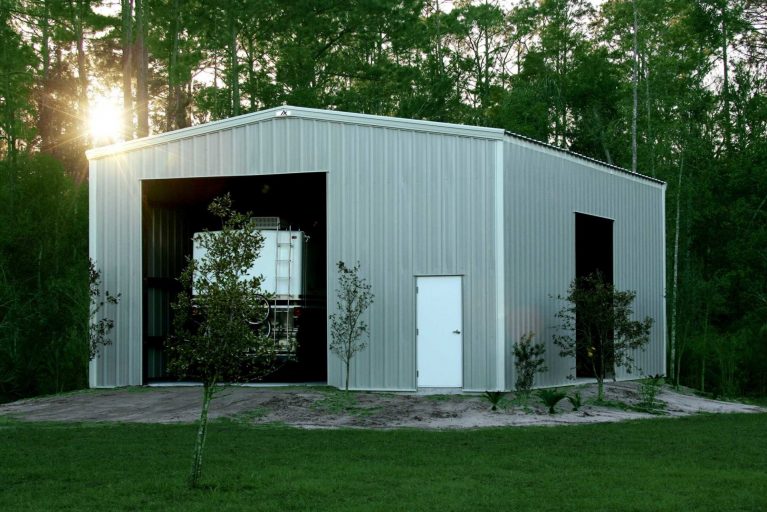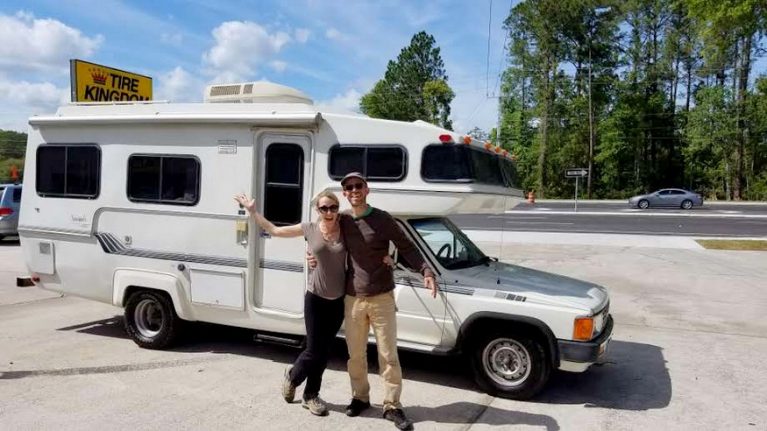What is the Best 12v Air Conditioner for RVs?
If you want to be able to stay cool in your RV when you are boondocking, you are going to need a 12 volt air conditioner.
In this post, we are going to introduce you to a couple of our favorite 12v air conditioners for RVs. You can scroll down in this article to find the recommendations. But first, you probably have some questions about air conditioning your RV. Let’s explain why it is important, the challenges you will need to overcome, what makes a 12v air conditioner so helpful, and the different types of RV air conditioner units.
Why You Need an Air Conditioner in Your RV
Unless you are staying in an area that is cold and cloudy all the time, air conditioning is pretty much a must in your RV.
RVs have huge windows up front and on all of their walls. Additionally, they lack the features that traditional homes have in their architecture to help release heat (like an attic). Living in an RV is thus rather like living in a greenhouse.
If it is, say, 80 degrees Fahrenheit outside, it is not unusual for the temperature at the front of your RV to measure 100 degrees Fahrenheit or higher. And that is often with an air conditioner running.
Challenges with Air Conditioning an RV

There are a few special challenges that go with air conditioning an RV:
#1 – Fighting an uphill battle
For the reasons we just discussed, cooling an RV effectively is much harder than cooling a house. The architecture and materials of your RV will not be doing you any favors. By default, with nothing running, the interior of your RV will usually be warmer than the exterior. You have a lot of cooling to do just to get it down to the same temperature you are dealing with outdoors. You then have even more cooling to do to get it down to a lower temperature.
A lot of people who move into an RV after living in a traditional house are completely unprepared for this situation. They are shocked when it is uncomfortably hot inside their RVs on a sunny day that is 70 degrees Fahrenheit outside. They are even more shocked when they find themselves in triple digits on a day that is 90 degrees Fahrenheit outdoors. And let’s not even get started on how hard it is to keep an RV liveable when it is actually triple digits outdoors.
#2 – Hard to cool the entire RV
An RV features a kind of “gradient” of heat. Typically, the front of the vehicle where the largest windows are is hottest. The orientation of the vehicle with respect to the sun as well as any shade outdoors are also going to have a huge impact on the temperatures throughout your RV.
It can be pretty hard to cool down your entire RV, despite the relatively small square footage. That is especially true if your air conditioner is located near the back.
Pro tip: A lot of RVers purchase two air conditioners, spacing them out across their rigs. This can help cool the entire RV more effectively.
Another idea is to invest in some high quality fans to direct the cool air from your AC throughout your RV.
You can also purchase shade cloths designed especially for RV windows (you can even get them custom made) that are made from the same material as greenhouse shade cloths. These can make a massive difference.
The shade cloths prevent the light from the sun from reaching your glass and transferring through it to convert into heat energy.
That means that your air conditioner(s) have less work to do to keep it cool inside your RV, as they do not have to battle with the sun through the windows quite as much.
As a result, your air conditioners will be able to achieve a cooler temperature than they would otherwise. They also will be able to work more efficiently, which will reduce your energy expenditures and also potentially prolong the longevity of your ACs.
#3 – Boondocking
Finally, let’s talk about boondocking. Let’s say you are parked somewhere you do not have access to hook-ups. That means you cannot run a 120 volt air conditioner. Alas, the majority of RV air conditioners are powered with 120 volts.
You could power the 120v AC using a generator, but let’s face it—they are loud, annoying, and cannot run indefinitely. There are also workarounds involving battery banks, inverters and solar cells, but these are not practical either.
That’s where 12 volt RV air conditioners come in! You can use your onboard battery bank to power a 12v AC unit, making it a viable alternative to a traditional 120v AC.
How Hard is it to Find a reliable 12 Volt Air Conditioner?
We are not going to beat around the bush—there are not a whole lot of 12 volt air conditioners on the market. Actually, some people may find themselves asking whether 12 volt ACs even exist. That is how rare they are.
But yes, 12 volt air conditioners for RVs do exist. There are just not a ton of models to choose from. Thankfully, we have done the hard work for you to bring you the best options.
Before we jump into the list though, there is a little more you should learn about choosing an air conditioner for your RV.
Types of RV Air Conditioners
One more thing that is useful to know before you start shopping for a 12 volt air conditioner for your RV is that there are several different major types of air conditioners. These include ceiling-mounted AC units, window air conditioners and portable air conditioners.
1. Ceiling-mounted air conditioners
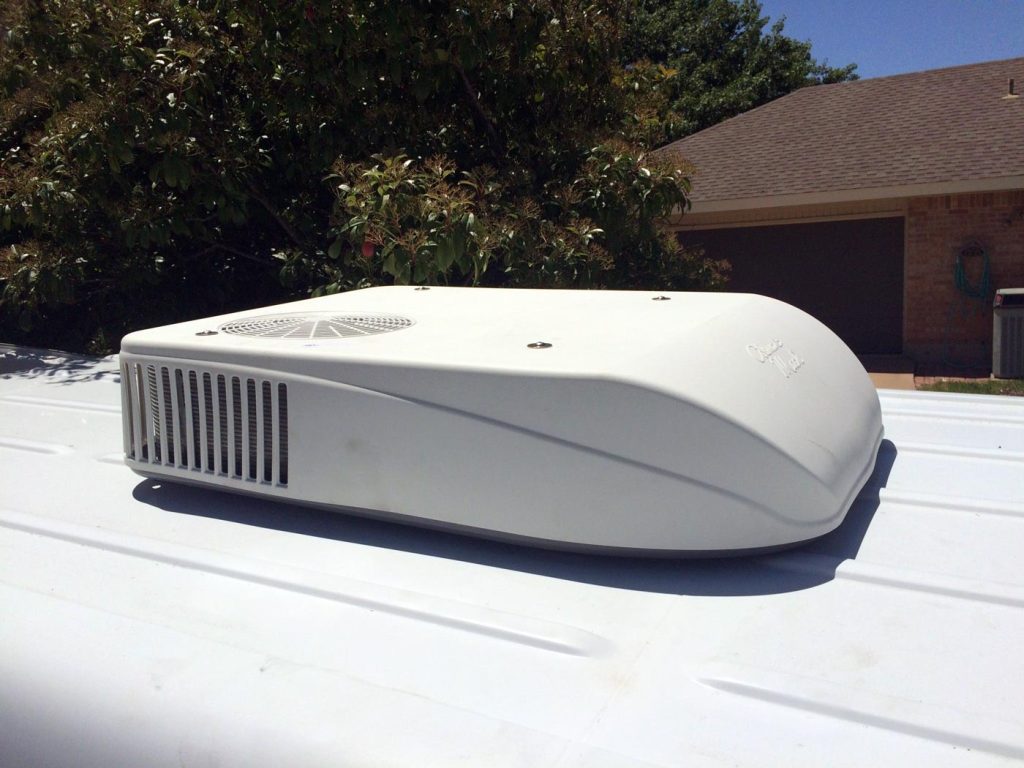
This is an air conditioner that is mounted directly to your ceiling/roof. When you buy an RV, it will usually have a ceiling-mounted unit already installed.
Ceiling-mounted air conditioners do a good job circulating cool air around. But if you want to buy a new one, you have the challenge of either 1-finding a compatible air conditioner that will fit where your old one was, or 2-modifying your roof/ceiling to accommodate a different unit. Needless to say, this can be complex and expensive in some cases.
2. Portable air conditioners
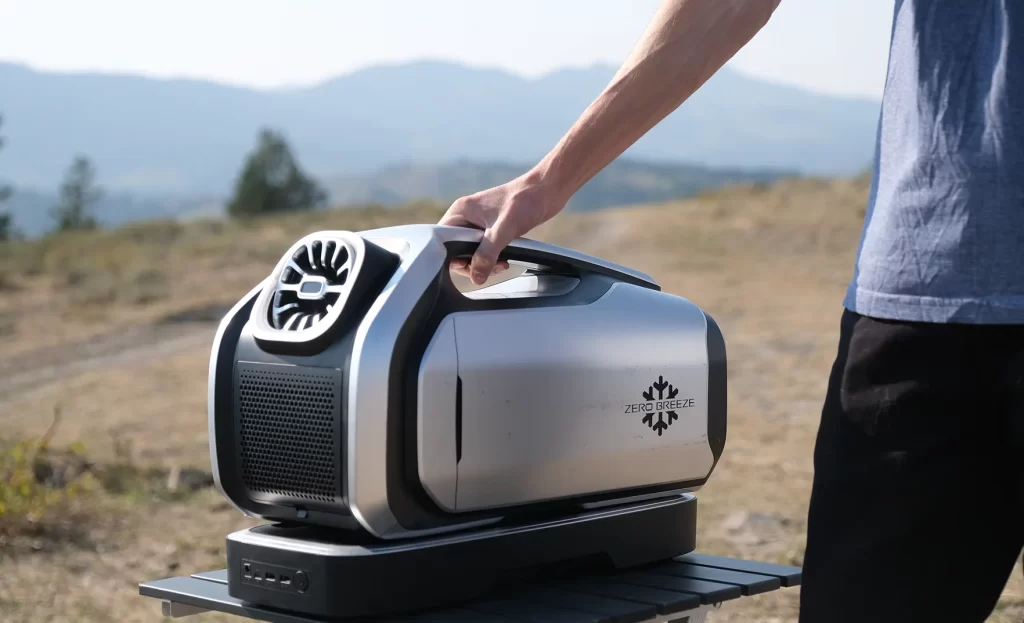
Portable air conditioners are one of the best options for your RV. These are standalone units that you can pick up and move around (or roll around, depending on the size and design). You need to feed a tube from the AC out through an opening to vent out hot air. This could be a window, a hole in the wall, etc.
The biggest logistical challenge here is just that you need to form as much of a seal as possible around the hose that is leading out of your RV. This may require a bit of engineering. It does not need to be 100% perfect, but the fewer and smaller any gaps are, the more efficiently the air conditioner will operate.
This is the type of air conditioner the author of this piece has. Installing one required creating a cover for one of the windows in the RV with a hole in it for the hose. It was a custom carpentry job. It was still easier, faster and less expensive than the hassle of installing a ceiling-mounted unit.
Another advantage of going with a portable air conditioner is the fact that it is, well, portable. If you eventually need to replace your RV with a new one, it will be much easier for you to bring your portable AC with you than it would be to take your old ceiling-mounted air conditioner and try to install it in a new vehicle.
So, in multiple ways, a portable air conditioner tends to be more cost-effective than a ceiling-mounted air conditioner—even if you are choosing a relatively expensive portable model.
3. Window units
Finally, one more type of air conditioner you can feasibly install in an RV is a window unit. Portable air conditioners may be situated indoors or outdoors depending on their designs, but window units go on the outside of your RV.
This leaves you with multiple challenges you need to deal with to achieve installation. Firstly, you have to manage the same thing you do with a portable AC, which is to find a way to create a sealed connection between indoors and outdoors.
One thing you are going to notice about this with RVs is that it is trickier than it is in a traditional house. Why? Because RV windows have curved edges, and most products built to help you install portable or window AC units in traditional houses are built for sharp corners.
The other challenge is that you need some way to mount the air conditioner. Your RV is not going to include some sort of convenient shelf or bracket on the outside for you to do this. So, you will need to concoct a solution. The product you are purchasing might have one if it was designed especially for RVs. But if it wasn’t, the engineering will be all up to you.
On the whole, we would say that window units are the least convenient type of RV air conditioner. In fact, you will find very few window units made or recommended especially for RVs, 12v or otherwise. Most of the products on the market are going to fall into the categories of portable air conditioners or ceiling-mounted air conditioners.
Top Recommended 12v Air Conditioners for RVs
Now you are familiar with the different types of air conditioners, and you understand why a 12 volt air conditioner can be a great addition to your RV. You also have some tips to help you maximize the efficiency of your system. Let’s take a look at a couple of top products.
1. ZERO BREEZE Mark 2 AC
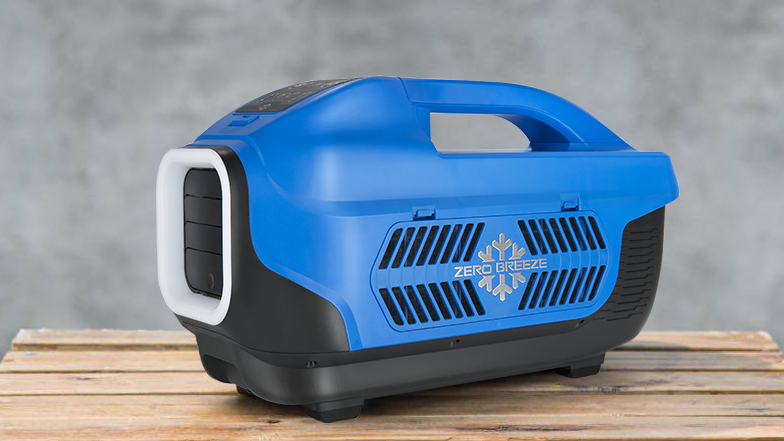
Our number one recommendation for a 12 volt air conditioner for your recreational vehicle is the ZERO BREEZE Mark 2 AC.
ZERO BREEZE describes its product as “the first real off-grid air conditioner.” As the company explains, “In 2016, we designed a first real portable battery-powered air conditioner and gained support from through crowdfunding on Kickstarter. We far surpassed any of our expectations in fundraising. In 2019, we learned from the first generation experiences and mistakes and launched a more mature and better true battery-driven air conditioner, the Mark 2.”
General Specs:
- Working Mode: Cool, Fan, Sleep, Strong
- Wind Speed Level: 4
- Sound Level: 52dB(A)
- Cooling Power: 2300 BTU
- Climate Type: T1
- Cooling Rated Input: 240W
- Rated Voltage: 24V DC
- Unit Size: 20″L x 10″W x 11″H
- Weight: 16.5lb
- Moisture Protection: IPX4
- Vent Hose Exhaust: Dual Hose
Battery Specs:
- Battery Type: 18650 Lithium-Ion Polymer Battery
- Capacity: 24V 35Ah/ 840Wh
- DC Charge Input: 18V-36V (Recommended input voltage: 21V-27V)
- Full Charge Time: About 6 hours
- (by official power adapter)
- DC Jack Output: 12V/5A Max
- USB Type C: PD(5V,9V,12V,20V/45W Max)
- USB Type A: 5V/2A Max
- Net Weight: 12lb
- Size: 20″L x 8.6″W x 2.3″H
- Operation Temperature: 0℃-40℃ / 32 °F-104 ℉
Why You’ll Love It
First of all, you will love the ZERO BREEZE Mark 2 for the simple reason that it does what you need. If you have spent much time looking for a 12 volt portable AC for your RV, you already know that by itself, that is a huge deal.
But there are a lot of other reasons to love the ZERO BREEZE Mark 2 as well. For one thing, it does a fantastic job. With 2,300 BTU, it can bring the temperature down by as much as 30 degrees Fahrenheit and cover up to 40 square feet. And it works fast. You can get that temperature drop in as little as 10 minutes.
It is also energy-efficient, so it is not going to break the bank to operate it. Plus, it keeps your carbon footprint to a minimum. You can even operate it in different modes to suit your needs, including Strong Mode, Cooling Mode, Fan Mode and Sleep Mode. The battery can keep it running for up to 3 hours in Strong Mode, or up to 8 hours in Sleep Mode.
The other thing you will appreciate about ZERO BREEZE is that its 20″L x 8.6″W x 2.3″H size and 16.5 pound weight make it truly lightweight and compact. When you live in an RV (or a van, or any other vehicle), every square foot of real estate counts. Being able to move the unit around also means that even though it has great coverage, you can take it with you to the part of the RV you are spending time in to get the very best cooling effect.
On top of its great design and features, we also recommend the Mark 2 because ZERO BREEZE has great policies. Shipping is free, there are 30-day returns, and you get a 1-year warranty on your AC. You can also pay in installments if you need to.
Best For:
For a high quality portable 12 volt air conditioner for your RV, you cannot go wrong with the ZERO BREEZE Mark 2. With its efficient operation, large coverage area, and portable, lightweight design, it is the best all-around choice.
2. Douglas D20 Rooftop Air Conditioner
If you are in search of a 12 volt air conditioner that you can mount on your ceiling in your RV, then the Douglas D20 Rooftop Air Conditioner is a model worth considering.
Specs:
- Model Info D20
- Item Weight 74 pounds
- Product Dimensions 32.7 x 24.8 x 7.6 inches
- Item model number D20
- Capacity 9800 Cubic Feet
- Installation Type Roof
- Part Number D20
- Special Features Easy to Install
- Color Black
- Voltage 12 Volts
- Batteries Included? No
- Batteries Required? Yes
- Warranty First 3 months labor; 12 months for parts.
Why You’ll Love It
There are very few rooftop air conditioner models that offer 12 volt operation. This one was designed with trucks in mind, but it can also be suitable for a small RV.
If you are driving your RV, your air conditioner’s batteries will recharge. When you park, you can then run it from the battery bank, making it perfect for boondockers.
Unless you are very handy and know your way around working on an RV, you will probably need to hire a pro to install this air conditioner, but they should find the installation relatively simple and straightforward. You receive installation steps with the product, which you can share with your professional.
Best For: Choose the Douglas D20 Rooftop Air Conditioner if you want a 12 volt air conditioner that you can mount on your ceiling/roof.
3. EcoFlow Wave 2 – Portable Air Conditioner/Heater
After hunting high and low, one more 12v air conditioner we found that is worth a look is the EcoFlow Wave 2. What makes this product extra exciting is that it also doubles as a heater, helping you keep your RV comfortable year-round. Like the ZERO BREEZE Mark 2, the EcoFlow Wave 2 is a portable AC, not a ceiling-mounted unit.
Specs:
- Capability Specifications
- Car Charging 200W, 12V/24V, 8A Max
- Add-on Battery 820W (1160 Wh capacity)
- AC Wall Charging 700W
- Solar Charging Input 400W
- Max. Running Time 8 hrs
- Cooling Capacity 5100 BTU
- Heating Capacity 6100 BTU
- Cooling Power 5100 BTU / 1500W
- Rated Running Power AC:560W / DC:505W
- Noise Level 48 ~ 56dB
- Weight 31.96 lbs
- Dimensions 20.39 x 11.69 x 13.22 inches
Why You’ll Love It
According to the manufacturer, the EcoFlow Wave 2 is the most powerful AC/heater in this specific size range. It is not quite as powerful as the ZERO BREEZE Mark 2, but it can handle 108 square feet, achieving a drop in temperature of around 11 degrees in 8 minutes. That area of coverage is simply outstanding.
This product offers fantastic flexibility as well; you can charge it using an AC outlet, a solar panel, a power station, or even a car outlet.
At 20.39 x 11.69 x 13.22 inches and 32 pounds, it is not quite as lightweight, compact and portable as the ZERO BREEZE Mark 2, but it is still pretty small and light compared to a lot of other portable ACs.
Best For: If you need a 12 volt combined air conditioner/heater that can cover a large area, then the EcoFlow Wave 2 might be the right product for you.
Get the 12v AC You Need to Keep Your RV Cool
Maintaining cool, liveable temperatures in a recreational vehicle can be a challenge, especially if you like to spend time off the grid. But it is not impossible.
High-quality 12v air conditioners like the ZERO BREEZE Mark 2 AC and the RecPro RV Air Conditioner can help you efficiently keep temperatures cool no matter where you are parked.
There is no reason to keep spending day after day in your RV with temperatures where you sit soaring into the triple digits.
To get a 12 volt air conditioner now that will help you finally live comfortably and safely, click on any of the links in this post.


